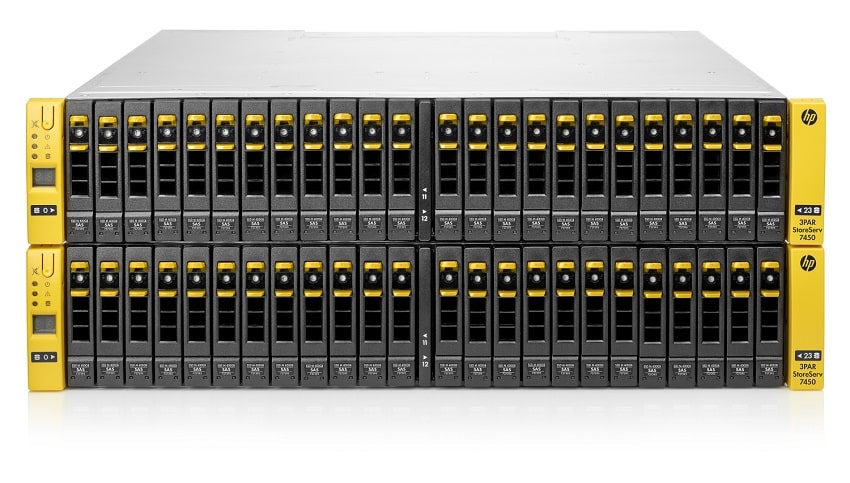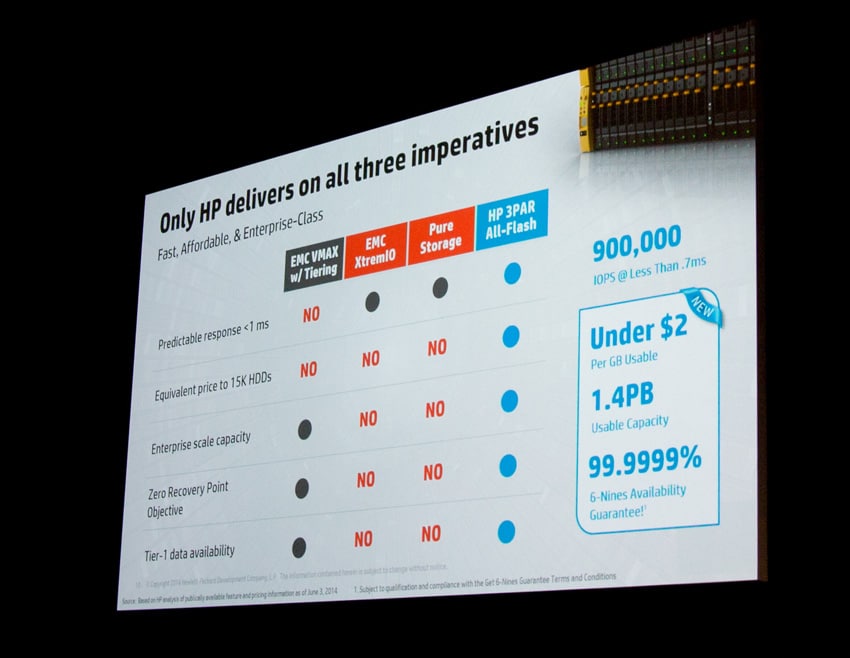
At the launch of HP Discover 2014 today, the company has announced a new all flash configuration of the HP 3PAR StoreServ 7450 Storage Array. The new enhancements to the StoreServ 7450 offer faster response times at the same price as spinning media, without sacrificing storage resiliency and scalability that many AFAs are missing. For users who worry about flash wear out cases, HP offers a five-year warranty on the SSDs with an unconditional replacement due to failures, media wear-out, or both.
In order to eliminate the cost and scale limitations, HP enhanced the 3PAR StoreServ 7450 with new and improved features such as hardware accelerated inline primary deduplication, thin cloning software, express indexing, and new 1.92TB MLC SSDs. The updated indexing feature and built-in Gen4 ASIC to support primary CPU are key to enabling rapid inline data services that takes the effective scale of the array from 460TB raw to more than 1.3PB of equivalent usable capacity. HP quotes pretty conservative numbers for the data sheet, but in aggregate sees their compresison ratios ranging from 4:1 to 10:1 depending on workload.
The SSDs in use are compelling for several reasons. HP has upped the ante by moving to high-capacity SSDs that help increase scale within a smaller footprint, while using consumer-grade MLC to help on the pricing side. The 1.92TB capacity is what's available raw; typically after over provisioning at the drive level for wear management, the end user would see 1.6TB available. HP instead uses their own technologies to manage the SSDs including System-Wide Sparing and Adaptive Sparing. With System-Wide Sparing, StoreServ reserves storage chunks across all drives, rather than dedicating specific drives as hot spares. This nets faster rebuilds in the event of a drive failure and keeps wear consistent across the drives in the array. With Adaptive sparing, StoreServ gets the capacity gains by reducing the built-in over provisioning, offloading much of the wear management to the array.
The combination of the SSDs with the new technologies will lower the cost of all-flash storage below $2 per usable gigabyte, which is roughly the going rate for 15K disk-based arrays today. Even with the lower cost target, HP maintains their mission-critical six 9's availability and offers inline data services and petabyte scale that may not be found in competing AFAs in the market today, especially by vendors without the depth of IP and engineering that HP and other large storage vendors have.
The new enhancements to the HP 3PAR StoreServ 7450 Storage Array will deliver:
- Lower latency for critical applications than traditional high-end arrays
- More predictable latency than hybrid or auto-tiered arrays at comparable pricing
- The scale to consolidate and support a wide range and variety of applications
- Tier1 features and a proven architecture lacking with first-generation all-flash appliances
Pricing and Availability
The 3PAR StoreServ 1.92TB MLC drives can be ordered next week with planned shipping in July at a list price of $14,315 per drive. 3PAR Thin Deduplication and 3PAR Thin Clones software for 3PAR StoreServ 7450 are expected to begin shipping as part of the 3PAR Operating System Software Suite in September 2014 at no additional charge. The five-year flash warranty is available now.
3PAR StoreServ 7450 product page


